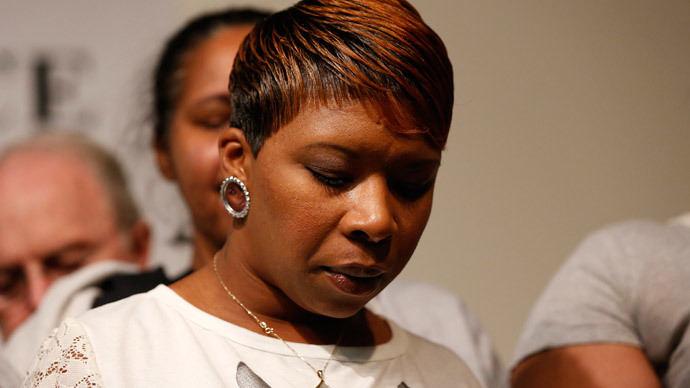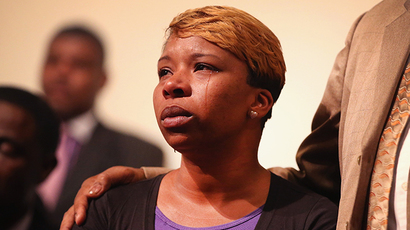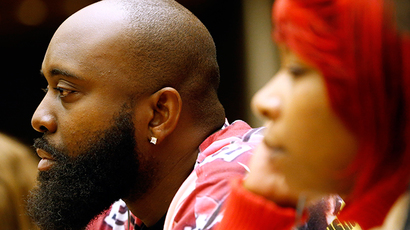Michael Brown’s family mulls lawsuit against Darren Wilson, Ferguson PD

The family of Michael Brown, the unarmed teen killed by a police officer in Ferguson, Missouri this summer, is considering suing the police officer who shot him, as well as the police department, for wrongful death.
With the Department of Justice all but admitting former Ferguson Police Officer Darren Wilson will not face federal civil rights charges for Brown’s August death and the grand jury’s decision not to indict the shooter, Brown’s relatives could turn to a lawsuit for justice. It is likely the only avenue of recourse still open to them.
READ MORE:Justice Department set to clear Ferguson police officer of civil rights charges
The teen’s death kicked off months of protests across the country against police brutality and racism. Several days of rioting occurred in Ferguson after Prosecutor Robert McCulloch announced the grand jury’s ruling in November.
Anthony Gray, an attorney representing the Brown family, confirmed to the Guardian that the family is considering a civil suit against Wilson.
“That is an option that is available,” Gray said. “They have not made a decision to move forward at this point, [but] that is an option that is always on the table.”
Legal experts do expect Brown's family to file a civil lawsuit against Wilson and the Ferguson Police Department, CNN reported.
"There might be a lot of political forces that would be at work that would give the Brown family a chance at a quick settlement," New York lawyer and former prosecutor Paul Callan told Reuters.
Joanna Schwartz, a UCLA law professor, agreed.
"There are so few cases in which officers are criminally charged, but plenty of instances in which very successful civil rights cases are brought," she said.
In a civil case, a plaintiff needs to show liability only by the preponderance of the evidence, not beyond a reasonable doubt.
It’s extremely difficult for the federal government to bring civil rights charges in cases like Ferguson because of the standard they face, lawyer and former prosecutor Mike Papantonio told RT.
“The federal government would have had to come forward and said that this was an intentional shooting based on race, that the shooting took place, the officer knew he shouldn’t have shot this individual, but he shot him anyway because he had some level of racial bias. Very tough standard,” he said.
But Papantonio thinks a lawsuit will be beneficial ‒ regardless of the outcome ‒ because it will reveal details and opinions that weren’t brought into the open during the grand jury period.
“The only story that’s going to be told is going to be told in court. And there’s going to be a wide latitude on how the story is told. It’s more difficult for the civil case to go forward, but there’s a different standard,” he told RT. “Civil cases is a totally different standard from a criminal case, where it comes to the jury looking at the facts and making a decision. There’s a greater weight of the evidence as opposed to beyond a reasonable doubt.”
“But the good news is, if they do go forward, we can hear the story. There’re going to be cross-examinations, they can put some of these forensic experts on the stand that said, ‘Yeah, this was a justified shooting’, you can cross-examine them.,” the Ring of Fire Radio host added. “This prosecutor failed to do that… This McCulloch prosecutor put on this absurd show there in Ferguson for his benefit, and not for the benefit of the victim, not for the benefit of that community.”
Could the family sue McCulloch?
Prosecutors enjoy absolute immunity from lawsuits, a “policy that makes it impossible to sue prosecutors who engage in misconduct, even when that misconduct results in a wrongful conviction,” according to the Washington Post.
But what if that misconduct is illegal?
Daily Kos believes that McCulloch may have suborned perjury ‒ meaning induce a witness to lie under oath ‒ by asking Sandy McElroy, often referred to as Witness 40, to testify to the grand jury, even though she “was thoroughly discredited in her interrogation by the FBI a month before she ever appeared on two separate occasions before the grand jury.”
In a December interview with St. Louis radio station AM 550, McCulloch said he made use of the “investigative power” of grand juries. It’s an aspect that is “rarely used,” Daily Kos noted, adding that McElroy had “already been thoroughly investigated by trained professionals and found to lack all credibility.”
“Amateur investigators were not needed in this case,” the blog added.
And McCulloch’s comment may be the loophole in absolute immunity that the Brown family needs to pursue a case. Because the Supreme Court has, over the years, introduced one limited exception to the policy: When prosecutors act as investigators.
READ MORE:Grand juror from Ferguson cases sues prosecutor to speak out
When the lawyer assumes the rule more often associated with police, they are only protected by qualified immunity, a doctrine that covers cops and other public officials. It’s “still a tough standard for a plaintiff to meet,” the Post noted in an article about a 2014 ruling by the 7th Circuit Court of Appeals.
In that case, Fields v. Wharrie, the plaintiff discovered that prosecution had knowingly coerced witnesses into giving false testimony, which led to his conviction. The three-judge panel ruled that the prosecutor could be sued in the case.
If the Brown family successfully wins a suit against Wilson, the former police officer would not face jail time, but could be found liable for Brown's death and made to pay damages to the family. However, the Ferguson Police Department (and thus the city’s taxpayers) would likely bear the burden of the costs, as he was acting in an official capacity during the incident, Mic reported.
The taxpayers would likely be similarly on the hook for damages if the teen’s family were to successfully sue McCulloch.














